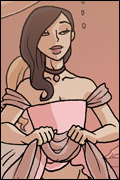|
Nah, Willow is clearly not an ent and Tolkien never uses the word to describe him. The Entwash is definitely mentioned in Fellowship, and Fangorn is referenced, since their route from Lorien to Parth Galen goes pretty near the former and the former will eventually lead one to the latter. Lewis is probably just getting tangled up by the division of the book into volumes; he had been hearing excerpts read to the Inklings for years by that point and had read the finished typescript well before it was published. He wrote the following letter in 1949:quote:My dear Tollers— Pretty harsh on Eddison imho. However I'd love to have been a fly on the wall for Tolkien rubbishing Lewis' suggested edits.
|
|
|
|

|
| # ? Jun 12, 2024 06:07 |
|
Can we rename this the Tollers thread
|
|
|
|
Sounds intolerable tbh
|
|
|
skasion posted:Nah, Willow is clearly not an ent and Tolkien never uses the word to describe him. The Entwash is definitely mentioned in Fellowship, and Fangorn is referenced, since their route from Lorien to Parth Galen goes pretty near the former and the former will eventually lead one to the latter. Lewis is probably just getting tangled up by the division of the book into volumes; he had been hearing excerpts read to the Inklings for years by that point and had read the finished typescript well before it was published. He wrote the following letter in 1949: I hope he sent Lewis a wastebasket for his birthday
|
|
|
|
|
Its interesting that in 1949 Lewis was saying that LotR was its own thing truly distinct from masterworks of literature before.
|
|
|
|
OctaviusBeaver posted:Lewis didn't do allegory either though. Aslan isn't an allegory for Jesus, he is literally Jesus taking the form of a Lion in Narnia. That's a retcon, though.
|
|
|
|
Silver2195 posted:That's a retcon, though.
|
|
|
|
Though obvious in hindsight I remember reading the narnia books as a kid and the alegory just flying past me. Like in one book the lion tells the kids to seek him in their world under another name, and I went through the whole series wondering what that was about and never making the connection untill someone told me the lion was supposed to be Jesus years later.
|
|
|
|
It's all a crappy callback to the climax of Voyage to Arcturus anyway
|
|
|
|
Avalerion posted:Though obvious in hindsight I remember reading the narnia books as a kid and the alegory just flying past me. Like in one book the lion tells the kids to seek him in their world under another name, and I went through the whole series wondering what that was about and never making the connection untill someone told me the lion was supposed to be Jesus years later. But if you are a bit older and have a bit more information you get the part in The Voyage of Dawn Treader where they literally find a Lamb at the end of the world that transforms into Aslan (this is where he tells them to seek him in their world) and its harder to be more obvious than if Lewis had Aslan die on a cross instead of the stone table.
|
|
|
|
Everyone talks about the bald allegories in Narnia but nobody talks about the Calormenes or Susan, both of which are bigger problems imho. Transparent simple allegories in a children's book may limit it to being a children's book, but there's some really troubling stuff in Lewis' presentation of the Calormenes and in his presentation of Susan. Hieronymous Alloy fucked around with this message at 15:05 on Sep 13, 2017 |
|
|
|
|
forever  at the critique of Susan in the final battle: "she like wears make up and adult business clothes and stuff!!!!" ah yes the nerve of Susan to put away childish things. at the critique of Susan in the final battle: "she like wears make up and adult business clothes and stuff!!!!" ah yes the nerve of Susan to put away childish things.
|
|
|
|
HIJK posted:forever Well she didn't really put away "childish things". She was a monarch and gave up on her responsibilities to go to parties and chase boys, if anything the second part is more childish. It's a less bad version of Edmund betraying everyone so he can eat candy and lord it over his siblings.
|
|
|
|
That's a very weird interpretation of what happened? Susan serves as Queen alongside her siblings until they all leave Narnia at the same time, pretty much by accident. Then she returns with them to free Narnia in Prince Caspian. She doesn't shirk any of her responsibilities in those stories - certainly less than other protagonists like Edmund and Eustace - and while she skeptical of Aslan's return she is explicitly forgiven for her doubt. At the end of Prince Caspian both her and Peter are told that they will never return to Narnia again because they are both too old. At no point does she 'give up' on her responsibilities; she is every bit as diligent and faithful as her siblings, and it Aslan that bars her return rather than her abandoning it or her subjects - Peter gets the same treatment, mind, and there is never the implication that he is in the wrong.
|
|
|
|
Yeah, but then later in life she just pretends it was all fantasy and dismisses the rest of their belief that Narnia was ever real. They all speak of her as an apostate.
|
|
|
|
|
Which could have been a coping mechanism. Having to grow up twice must really mess with you, and probably hit her harder due to being the older of the girls.
|
|
|
|
I have a couple thoughts on this, but I want to wait until I get home because I want to confirm my memories of the Last Battle and other books are accurate.
|
|
|
|
Ashcans posted:That's a very weird interpretation of what happened? Susan serves as Queen alongside her siblings until they all leave Narnia at the same time, pretty much by accident. Then she returns with them to free Narnia in Prince Caspian. She doesn't shirk any of her responsibilities in those stories - certainly less than other protagonists like Edmund and Eustace - and while she skeptical of Aslan's return she is explicitly forgiven for her doubt. At the end of Prince Caspian both her and Peter are told that they will never return to Narnia again because they are both too old. Oops, yeah I remembered wrong. She actually comes off better than I remember. Like Data Graham said I remember her later pretending that Narnia was pretend and I got mixed up. I can't remember what book it was but Lewis said something like "When I became a man I put away childish things - including the desire to look grown up". So I think if Susan genuinely lost interest in Narnia because she got older and changed, that would be one thing. But if she just pretended to forget about it to appear more grown up that would be worse, and would in fact be acting childishly.
|
|
|
|
Avalerion posted:Which could have been a coping mechanism. Having to grow up twice must really mess with you, and probably hit her harder due to being the older of the girls. Yeah, the fact that Lewis never addressed this always bothered me as a kid. At the time being forced to go through childhood again seemed like personal hell, I was quite perturbed that it just happened to them. It rather lends credence to Susan's later point of view.
|
|
|
|
Growing up evangelical backwoods Christian, it was always made very clear to me that lipstick + boys + attempts to seem more grown-up = Susan lost her virginity. Obviously Aslan wasn't having any of that poo poo. Girls don't go to heaven if they fuckin around.
|
|
|
|
Ok, so I came back to this after leafing through the Last Battle last night. To recap the events that I think are at the core of the Susam Problem, in Narnia King Tirian and his forces lose their fight and are forced into the stable - there he finds the 'Seven Friends', which are basically all the kids who have been to Narnia minus Susan. At this point they don't really know what happened - they remember being on the train/in the station, and then being pulled into this place, just like had happened previously with trips to Narnia. Tirian asks after Susan, and what follows is more or less a page of everyone trashing her - now, to my mind this reads a lot more like siblings bitching about their sister behind her back than anything else. It doesn't really sound like the faithful exiling an Apostate, especially Lucy who sounds entirely like a teenage girl grumping about her adult sister. Now Aslan turns up, everyone witnesses the end of Narnia, and they move 'further up and further in' to find that they're in a sort of larger, better Narnia than the one that died. At the conclusion of this, Aslan reveals that they were all killed in the crash, and that this is the afterlife - further, they can actually see all the way out of Narnia to an equivalent version of England, where their parents are clearly happy and waiting. As a sidenote, after discovering that they and their parents are dead, no one actually spares a thought for poor Susan, who is stuck in the 'Shadowlands' with her entire family dead. Now, I think that the most forgiving interpretation here is that Susan didn't appear because she wasn't on the train - rather than working with the others to get the rings, etc, she was doing her own stuff and so she survives the crash. Aslan used his power to draw the others to him at their deaths, presumably because their dying created a loophole in that whole 'too old' thing that seems to have generally been a rule. So in this sense, Susan is still excluded and suffering rather cruelly, but we can guess that she will join the others in Heaven England when she too passes. There are a couple reasons why I would suggest this: 1) Permanently excluding Susan from Heaven seems pretty dark, especially for Lewis. The idea of people redeeming themselves is recurring in the series, and it would be pretty weird to drat someone 'off screen' like this. 2) During the end of Narnia, we see a number of people who are allowed entry despite what seem to be failures on their parts. This includes Emeth, the Calormene, who deliberately worships Tash. Aslan explains that because he was noble and good in his pursuit of Tash, he gains entry because Tash is an evil creature who cannot receive good works - those things entitle Emeth to Aslan's paradise. So, admittance to Heaven does not depend on faith in Aslan, people may arrive there through their own good works even if they were done in faith to a different god. Second, we see some of the Dwarfs admitted, including specifically some of those that chose 'Dwarfs for the Dwarfs' and killed talking Horses. These are admitted at the time of Judgement, and I can only assume that they are permitted on some basis that they held faith with Aslan even though they acted poorly. So it seems there are at least two avenues to enter Aslan's paradise - to accept Aslan and enter despite your sins, or to not know him and enter because of your works. We also see that Puzzle, the donkey that served as the false Aslan, is admitted into Heaven after a private talk with Aslan. We also see that the parents of the Pevensie children were admitted to their own English heaven. To say that Susan is eternally damned would mean that her sins have to rank above all these people. We aren't told very much about her in the book, but all the criticism seems to be that she is frivolous, perhaps foolish, and strives to appear as a grown up. We have no indication that she is cruel, or callous, or spiteful. Even her dismissal of Narnia is framed as an amusement more than anything else. It seems strange that she would be damned above all these others, especially as there is no reason to think that she might be equally pious in her own, 'grown up' way - presumably which was enough to earn her parents admission to Heaven. But even if we can say there is textual support that Susan isn't excluded forever, I think the real heart of the problem is what Lewis was trying to do with her limited inclusion. Susan isn't simply forgotten, he deliberately notes her absence and uses it as a chance for her siblings to castigate her, and then she is never mentioned again - even when it would suit someone of such a gentle heart as say, Lucy, to feel sorry for her left alone in the Shadowlands. It's a very strange choice, particularly because all her supposed transgressions take place 'off screen' and are only briefly related to us. In the Chronicles we see people redeemed from far worse transgressions than we ever really hear from Susan, but for some reason she is left in the cold, without even a clear hint that she will be eventually rejoined - it took me a good deal of re-reading and thought to scrape together the above interpretation at allows, at best, that she'll eventually see her family again. His treatment of her seems almost petty, and when I was boring my wife with these thoughts she remarked that it seemed more like Susan was based on someone he knew and had felt piqued at than anything else. In the Screwtape Letters, Lewis reflects that the smallest of sins are no less dangerous: quote:It does not matter how small the sins are provided that their cumulative effect is to edge the man away from the Light and out into the Nothing. Murder is no better than cards if cards do the trick. Indeed the safest road to Hell is the gradual one–the gentle slope, soft underfoot, without sudden turnings, without milestones, without signposts I think it's possible that in Susan, Lewis was trying to embody this earlier thought - that she had been led astray by a patter of smaller sins rather than a single act. Maybe he was aware that was a far greater risk to his audience than the general perils in the books. If so, it's still very badly framed and shaped, because we never actually see her transgressions, her justification for them, and she is offered no chance to redeem from them. Unfortunately, the things that we do hear (lipstick, nylons, and invitations) make the problem seem less about frivolousness, and more like this: elise the great posted:Growing up evangelical backwoods Christian, it was always made very clear to me that lipstick + boys + attempts to seem more grown-up = Susan lost her virginity. Obviously Aslan wasn't having any of that poo poo. Girls don't go to heaven if they fuckin around. As an unrelated sidenote, Jill and Eustace enter the Narnian Heaven through the stable, and presumably get to stay there with everyone else - so they never return to England. I guess this means that they just abruptly go missing and their families are left wondering forever what happened to them? Seems a little bleak.
|
|
|
|
I feel like Lewis's The Problem of Pain is probably relevant too, but I'd have to go re-read it to make the argument and I have zero inclination to do that. From Susan's perspective, she goes from having a family to having to identify a bunch of train-mangled bodies; she receives no further revelations. Theological christianity can lead to a lot of non-intuitive and weird conclusions, and Lewis deals with those theological problems a little more directly in The Problem of Pain than he does elsewhere. Ultimately, I suspect the Problem of Susan and the Problem of Pain are the same problem; why must Susan suffer the real?
|
|
|
|
|
Ashcans posted:As an unrelated sidenote, Jill and Eustace enter the Narnian Heaven through the stable, and presumably get to stay there with everyone else - so they never return to England. I guess this means that they just abruptly go missing and their families are left wondering forever what happened to them? Seems a little bleak. I'm pretty sure they say they were waiting for the train and it was coming in weirdly fast, so the implication is that it took out people on the platform too. They just got shunted to Narnia while the others got plonked in the Stable.
|
|
|
|
Did episode 28 of Exploring Lord of the Rings get deleted or did he misnumber them?
euphronius fucked around with this message at 14:29 on Sep 20, 2017 |
|
|
|
Lol you're like 12 hours ahead of me Have they made it to Bree yet
|
|
|
|
|
Data Graham posted:Lol you're like 12 hours ahead of me No Still inside Tom bombadils house. Last episode was pretty fantastic in its analysis of fairy tale norms and how Tolkien subverts them.
|
|
|
|
Nice. Doing both this series (with its "let's analyze every single word choice and every piece of imagery" approach) and the Return of the Shadow/Treason of Isengard one (which gives a lot more historical context and gives us glimpses into his life as a human with drinking buddies who poked fun at his fairy tales while secretly envying the gently caress out of them) at the same time is a lot of fun. Does Olsen ever gain the ability to say "Lady .. . . . . . ... Shmebulock" or "Ambrosius .. . . . .. ... . Aurelianus" without the pause in the middle as though he's never encountered or said the names before
|
|
|
|
|
http://www.clickhole.com/quiz/how-well-do-you-know-hobbett-1599
|
|
|
|
lol so random
|
|
|
|
Listening to Ep 30 right now: a listener argues Goldberry isn't a water spirit but a water flower spirit . Prof Olsen agrees and is going nuts. This is awesome .
|
|
|
|
Yo this is a major revolution in Tolkien studies and you all are like "'man, about those Balrog wings......" Goldberry as a water Plant spirit is loving revolutionary
|
|
|
|
Goldberry is Old Man Willow. This was sorted years ago.
|
|
|
sassassin posted:Goldberry is Old Man Willow. This was sorted years ago. 
|
|
|
|
|
Lmao I just got to the bit where he suddenly goes off on rap/hip-hop and says he doesn't like it because the rappers always sing aggrandizingly about themselves, "in a kind of sad perversion of Tom Bombadil's rhyme" He's all like "wait this is the whitest thing that has ever been said, quick someone write a Mythmoot paper on what rap has in common with the Music of the Ainur"
|
|
|
|
Now he's talking about his favorite simile in the whole book, where Frodo and the party meet Goldberry:quote:They came a few timid steps further into the room, and began to bow low, feeling strangely surprised and awkward, like folk that, knocking at a cottage door to beg for a drink of water, have been answered by a fair young elf-queen clad in living flowers. And he's going on about how it's so ingenious because it takes the entire purpose of a simile and turns it on its head—instead of describing an unfamiliar thing by likening it to something you're already familiar with, he's doing this amazing meta stunt by using an equally alien image in the comparison as a means to show that it's impossible to "describe the indescribable". And I'm like yeah okay, but really to me it sounds more like he maybe just wasn't trying very hard? Kind of a Poe's Law thing. Like if he was doing some super coolman meta linguistic flourish he might have shown something just as alien but not as on-the-nose in its likeness to them opening the door to a cottage and being greeted by a supernatural-ish lady. You know? There are other alien things he could have drawn on than exactly the same thing they're already doing. If anything deliberate I'd think he might be trying to come up with one of those "world's worst analogies" things. I feel like Tolkien might have made a fine Douglas Adams type, if he'd gone in a slightly different direction
|
|
|
|
|
You know, just slightly.
|
|
|
|
I can see why you'd think it was just a failed analogy. It may be .
|
|
|
|
I dunno, I think it was something made to deliberately catch the reader off-guard. It breaks your flow of the reading, makes you stop and really consider the sentence you just read. Which is the whole point.
|
|
|
|
When Tolkien was a boy that was something that happened. English countryside was full of elf-queens (slang).
|
|
|
|

|
| # ? Jun 12, 2024 06:07 |
|
What is the highest resolution / best quality version of the LotR movies available for streaming? I don't want to go down the Blu-Ray route, but modern 4K screens spoil me.
|
|
|

























